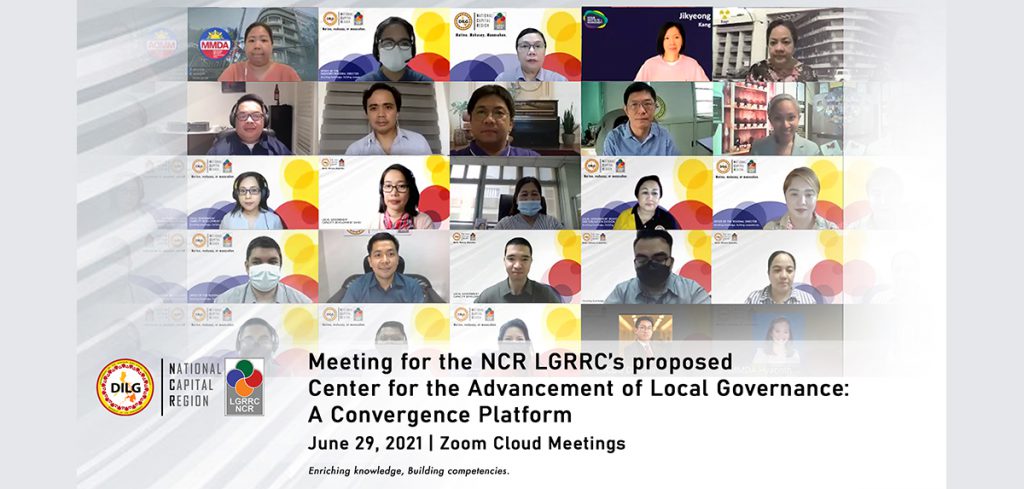
To strengthen efforts in capacitating local government units towards attaining inclusive and sustainable development, the DILG-NCR Local Governance Regional Resource Center (LGRRC-NCR) proposed the establishment of the Center for the Advancement of Local Governance (CALG) last June 29.
The Center, a reconceptualization of the LGRRC-NCR itself, will support the promotion of partnership among key actors in government agencies and learning and research institutions to harmonize and streamline LGU capacity development interventions.
Directors and technical officers from the Metropolitan Manila Development Authority, Department of Budget and Management â NCR, Department of Public Works and Highways â NCR participated in the meeting, together with administrators and academics from the Asian Institute of Management, Development Academy of the Philippinesâ Center for Governance, Ateneo School of Government â Policy Center, and the University of Makati.
Once formally organized, the CALG will carry on and enhance the work of the LGRRC aimed at creating learning communities to pursue local governance excellence through knowledge sharing and innovation-building.
One of the biggest roles that the members will face in the succeeding months and years is on empowering LGUs to take on new responsibilities as the government implements the Supreme Court ruling on the Mandanas-Garcia case, which increases the LGUsâ share in the internal revenue allotment (IRA).
This ruling is expected to affect national and local governance landscapes as more roles, functions, and services will be devolved to LGUs, thus, guidance, policies, and capacity development interventions introduced through the CALG will be aligned with the provisions of Executive Order No. 138 on full devolution.
Under Section 9 of EO 138, the DILG âshall optimize the functions of its LGRRC as convergence platform for capacity development.â As such, the CALG will serve as the bridge for member agencies and organizations to connect with LGUs and implement capacity development programs at the local level.
Efforts will also involve bringing in and consulting key stakeholders to ensure that interventions to LGUs are applicable to the NCR context. Moreover, the CALGâs goal will
also touch not only in the transition to full devolution but also in the continuing efforts to respond to and recover from the impacts of the COVID-19 pandemic.
DILG-NCR Regional Director Maria Lourdes Agustin hoped that agencies and academic institutions present will actively engage in the Center and will utilize the new platform to harmonize efforts and maximize knowledge and technical resources to improve governance outcomes.
âOur ultimate goal is to empower local government unitsâthat includes not only the local officials and functionaries, but also the people they serveâto promote inclusive and sustainable development. By addressing the capacity development needs of these stakeholders, we hope we will be able to manifest genuinely participatory and effective local governance,â she said.
LGRRC-NCR has been recognized for its knowledge management innovations as the first DILG resource center to promote virtual classrooms for accessible learning with the Barangay Newly Elected Officials Online Portal or BNEO Online in 2018.
It also successfully established linkages with different development partners to facilitate local and international scholarships for its technical officers to build DILG-NCRâs pool of experts in different local governance facets. #
